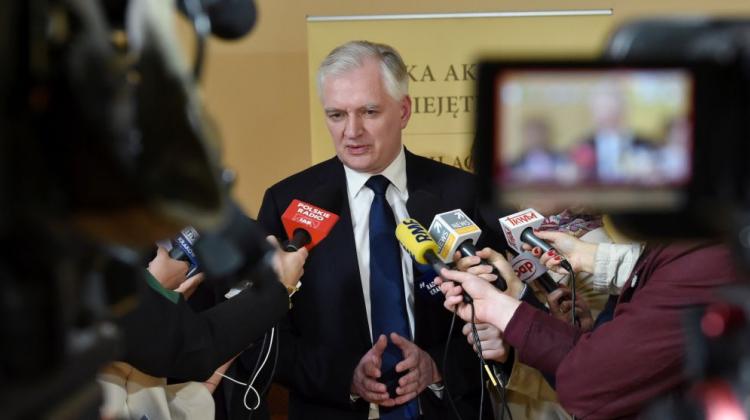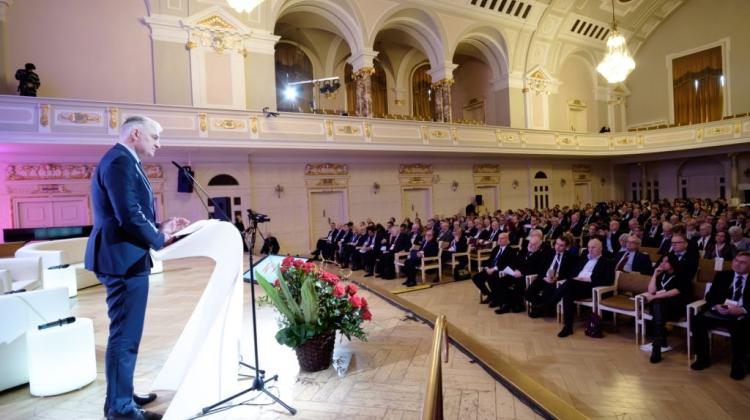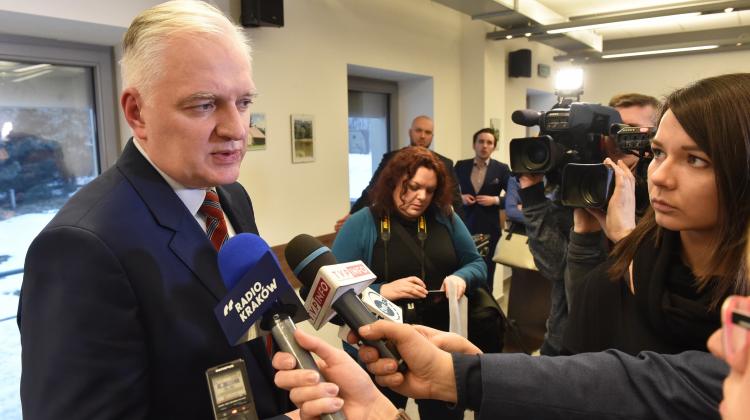Gowin on cutting red tape at universities
 Photo: PAP 2016 / Jacek Bednarczyk
Photo: PAP 2016 / Jacek Bednarczyk
A new philosophy of functioning of the Polish Accreditation Committee, changes in the National Qualifications Framework and less frequent periodic evaluation of academic staff are expected to contribute to more freedom and less bureaucracy for universities - said the Minister of Science and Higher Education Jarosław Gowin.
Ministry of Science and Higher Education is working on an amendment to the Law on Higher Education. The draft is ready and consulted. "I hope that in the beginning of May it will go to the Parliament" - said Gowin last Monday in Kraków. He added that he will ask MPs to process this amendment urgently and above political divisions, especially that the academic community approves of the proposed changes.
Last Monday at the Polish Academy of Arts and Sciences in Kraków Gowin met with representatives of universities and academics at a conference on bureaucracy. "We are dealing with a nightmarish hydra, and one we are feeding ourselves" - president of the Polish Academy of Arts and Sciences Prof. Andrzej Białas spoke about bureaucracy. He recalled the words of Czesław Miłosz: "The avalanche changes its course depending on the stones it rolls over". "That is the point: we all have to somehow try to discharge or stop this avalanche of bureaucracy. Of course, the minister can do more, because as we all know: power comes with size" - said Prof. Białas.
Minister Gowin said that from October 1 he wants to eliminate unnecessary reports and bureaucracy. "These tons of paper will not only save forests, but above all perhaps the most valuable asset, which Poland has: the minds of Polish scientists. We need to unburden them from bureaucracy, so that they can focus on their mission, which is educating the next generations, shaping future Polish elites and practicing science" - said Gowin.
The minister announced changes to the formula of the functioning of the Accreditation Committee. "The Committee experts should not be controllers, but rather mentors who help universities to raise the level of education to the highest peak, up to the level of excellence" - said Gowin. "We will dramatically thin the National Qualifications Framework, that have been a curse so far" - he said.
The minister stressed that it is not possible to completely abolish National Qualifications Framework, because their use is required by the EU, without them Polish students would not be allowed to participate in the Erasmus program, and Polish scientists would have limited opportunities to participate in international grants. "While maintaining the National Qualifications Framework, we want to give them a reasonable shape. Today\'s discussion at the Polish Academy of Arts and Sciences indicates that this direction of change has the full approval of the academic community" - emphasised Gowin.
He added that the system of periodic evaluations of university employees would also be changed. Currently, evaluations are carried out every two years, which - as Gowin noted - in the case of the largest universities makes this a looped process and turns into a "bureaucratic fiction". "We are reverting to the solution, in which evaluation should to be carried out not less frequently than once every four years. If there are disturbing signals, university authorities can always carry out this assessment more often" - said Gowin.
The Minister of Science stressed that until now the Ministry regulations interfered too deeply in various specific issues that should be at the discretion of university authorities, and should be determined in the statutes of universities.
Gowin reminded that until the end of April the Ministry of Science is waiting for applications of teams that propose the assumptions of a new law on higher education, the so-called Law 2.0. The jury, chaired by Prof. Tomasz Dietl, will select the best three projects, and the selected teams will start wide public consultation.
The result of the work of these three teams of experts will be three competitive, independent detailed draft law assumptions. "In autumn, the competition will be accompanied a series of events, conferences, symposia, which will constitute the National Congress of Science. The final of this congress will be held in September 2017, and by then we will have a proposal of a new draft law on higher education, discussed both within academia and between the Ministry and the academic community" - said Gowin.
The Minister expressed the hope that the voice of the young generation of scientists will be particularly strong this community debate. He emphasised that the new law should be a "constitution for the Polish science of the twenty-first century". "University management system will be one of the most important decisions that we will have to take in the future. The question is whether we decide to maintain the ultra-democratic model of rector selection, or consider switching to managerial model. All the world\'s leading universities use the managerial model" - said Jarosław Gowin.
PAP - Science and Scholarship in Poland
wos/ mhr/ mrt/
tr. RL
Przed dodaniem komentarza prosimy o zapoznanie z Regulaminem forum serwisu Nauka w Polsce.


















